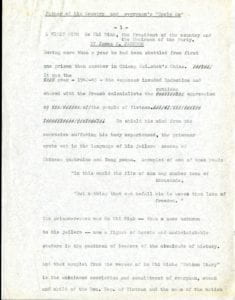James E. Jackson, Marxism, and Afro-Asian Thought in the Cold War

Typescript titled Father of His Country and Everyman’s Uncle Ho by James E. Cooper; James E. Jackson and Esther Cooper Jackson Papers; TAM 347; box 21; folder 4; Tamiment Library/Robert F. Wagner Labor Archives, New York University.
This post is authored by Ruodi Duan, a 2019-2020 Agnese N. Haury Dissertation Fellow at NYU and Ph.D. candidate in international history at Harvard University.
The James E. Jackson and Esther Cooper Jackson Papers at the Tamiment Library are an immense, multimedia collection that provide unique insight into the intersection of twentieth-century Marxist organization and race politics in the United States. James E. Jackson’s public and private writings, given his lifelong commitment to international socialism and to U.S. racial equality, figure prominently in my dissertation, which more broadly charts the rise and ebb of Afro-Asian thought in the Cold War.
Jackson’s activism was remarkable for both its breadth and its longevity. A veteran of World War II, his political initiation had been in the founding of the Southern Negro Youth Congress, before serving in a variety of important positions for Communist Party-USA (CPUSA). Before, during, and after his terms as chief editor of The Worker, the official newspaper of CPUSA, which was from the late 1950s to the mid-1960s, Jackson wrote prolifically for many communist publications, most frequently the magazine Political Affairs. The multitude of pieces included his reflections on race, class, Marxism, revolution, and national liberation, as well as articles probing into the nature and implications of consequential global matters such as decolonization in Asia and Africa, the Vietnam War, and the Sino-Soviet Split. In particular for my research, Series II Box 2 (Clippings), Series VII Box 8 (Lectures), Series XI Box 12 (Speeches), and Series XII Box 13 (Subject Files) have been tremendously illuminating.
I am especially interested in Jackson’s voluminous number of personal notes about the past, present, and future of socialism in the Asian and African world, and the photographic and written mementos from his 1959 visit to China and his visits to Vietnam in the 1960s. Jackson was a devoted Marxist-Leninist who believed that the Soviet Union occupied a central position in the global anti-imperialist and socialist movements. As such, his feelings about the Chinese Communist Party—which are important to my story because they capture the frustrations and dilemmas of Cold War Afro-Asian thought—ranged from resentment to anger. In a sense, his grievances with Maoism stemmed from his lifelong commitment to internationalism, in terms of socialist, postcolonial, and Afro-Asian unities.
Jackson celebrated the 1971 seating of Beijing in the United Nations, replacing the Republic of China (Taiwan), as a major step forward for anti-imperialists around the world. Yet, he believed that while Beijing’s claim to representation was righteous, the triumph had actually hinged on the concerted advocacy of all the socialist countries in spite of “the distressful persistence of some Maoists employing such anti-Soviet slanders as ‘Soviet imperialism’ in their arguments.” With biting sarcasm, Jackson proceeded to suggest that the laboring classes as a whole but “the Communist Party of China in particular” should draw from this episode the crucial lesson that “Victory over imperialism… comes not through secret intrigues with one’s enemy, but through strengthening the bonds of unity with one’s friends.”[1] This was a characteristic critique from Jackson, who maintained the conviction that the Sino-Soviet split was a pointless contest and provocation between two brothers whose political interests were essentially aligned.
In spite of Jackson’s significant contributions to the course of twentieth-century Marxist, black internationalist, and Afro-Asian thought, few works of scholarship have specifically grappled with his work as a theoretician and intellectual-activist who had always believed that the fortunes and futures of all the working classes and the postcolonial world were entwined. It is my hope to make use of this collection to shed new light on the Cold War interface between black internationalism, Afro-Asianism, and global socialism.
[1] James E. Jackson, “Unity Lesson in the U.N. Vote,” November 7, 1971; James E. Jackson and Esther Cooper Jackson Papers; TAM 347; box 2; folder 13; Tamiment Library/Robert F. Wagner Labor Archives, New York University.